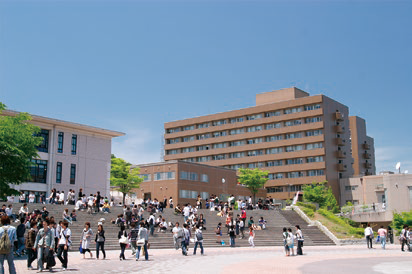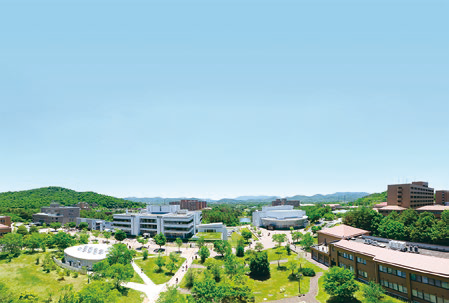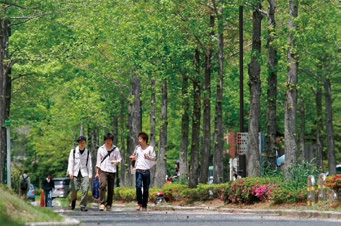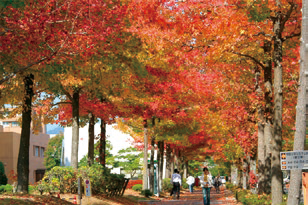Mission (From Splendor Plan 2017)
By establishing a new philosophy of peace science “Science for Sustainable Development,” Hiroshima University will contribute to the realization of a diversified, free, and peaceful global society.

Research: Enhancement of basic and advanced studies leading to “Science for Sustainable Development”
Hiroshima University (HU) has been selected as one of the institutions designated under “The Program for Promoting the Enhancement of Research Universities” by the Ministry of Education, Culture, Sports, Science and Technology (MEXT) for FY2013-2022. Under this initiative, HU launched diverse centers in order to grow its research capacity, including the Genome Editing Innovation Center, Center of KANSEI (integrated feeling of emotion and cognition) Innovation Nurturing Mental Wealth, Hiroshima Research Center for Healthy Aging, and Chirality Research Center. HU hosts unique research facilities and institutes such as the Hiroshima Synchrotron Radiation Center, Amphibian Research Center, Research Institute for Radiation Biology and Medicine, the Kanata telescope (1.5m optical near-infrared), and Research Institute for Higher Education. In order to achieve the institutional mission, the Network for Education and Research on Peace and Sustainability was established in 2018.
Education: Cultivating individuals who can oversee a changing world and can challenge existing norms on a global scale
One unique aspect of education at HU is the opportunities for international experiences, including the Hiroshima University Study Abroad Program, various international programs by the Morito Institute of Global Higher Education, an undergraduate program called Integrated Global Studies that is taught in English, and double-degree programs. HU has been selected as one of Japan’s top 13 universities for the “Top Global University Project (Top Type) (FY2014-2023)” by MEXT, which enabled HU to develop infrastructures and initiatives for globalization. In 2019, HU also started the Frontier Development Program for Genome Editing and integrated a Master’s-PhD course that will prepare students to contribute innovations to society.
Industry-Academia / Social Collaboration: Strengthening partnerships with regional and international societies
HU focuses on organizational and long-term collaboration with industry through Comprehensive Partner Agreements and Collaborative Research Labs. HU has established 23 Collaborative Research Labs and 5 are funded by Mazda, a major automotive manufacturer in Hiroshima. HU’s collaborations with corporate and governmental partners are diverse, including MEXT’s DESIGN-i Program “Sustainable University Town Initiative Driven by Academic Enterprise” in collaboration with a local government. Other recent and major developments include Digital Monozukuri (Manufacturing) Education and Research Center; the Center of KANSEI Innovation Nurturing Mental Health; Program on Open Innovation Platform with Enterprises, Research Institute and Academia (OPERA) in genome editing technology; and Resilience Research Center. The Translational Research Center was established in 2018 to streamline basic research outcomes to commercialization, applying Design Thinking and Bio Design education. Furthermore, the Open Innovation Division was established in 2019. HU also promotes university start-ups through incubation support as well as entrepreneurship and education for management of technology.
Research Support System and Environment
The Office of Academic Research and Industry-Government Collaboration and its University Research Administrators provide resources and support for faculty members for R&D funding acquisition. HU provides various internal funds on a competitive and strategic basis, including those for young researchers and female researchers.
Researcher Development
HU provides university-wide faculty development programs in various topics. In addition, HU established the regional industry-academia-government consortium, HIRAKU (Home for Innovative Researchers and Academic Knowledge Users), in collaboration with other universities, private companies and public organizations in western Japan, to foster young researchers. HIRAKU and HU provide a range of opportunities and resources for professional development for early-career researchers, including funding, mentoring, workshops, and networking opportunities. For doctoral students and postdocs, HIRAKU and HU provide long-term internship opportunities and transferable skills trainings to broaden their career paths. Since 2015, HIRAKU has held the Three Minute Thesis Competition to strengthen doctoral students’ communication skills and highlight opportunities in doctoral research.




 Home
Home




